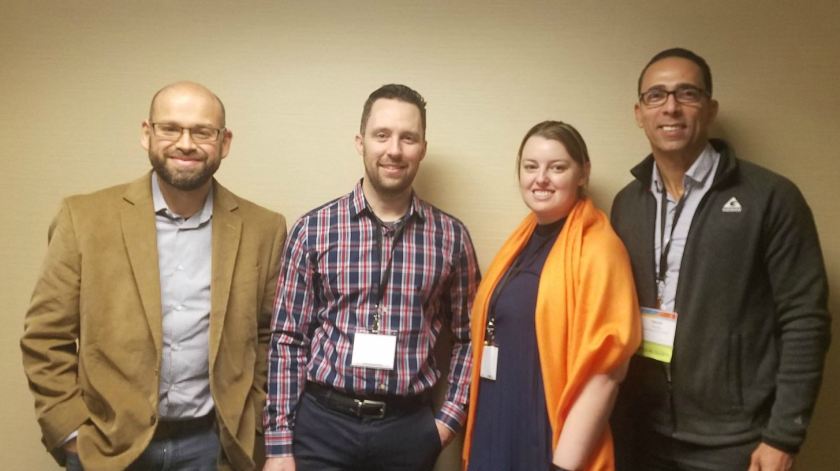By Harold “Harry” Young of Austin Peay State University

They stood in place at each poster in the exhibit hall, graduate students eager to share their research with anyone willing to take the time to listen, ask questions, or possibly offer some instructive or encouraging advice.
While sometimes considered as a consolation prize by more experienced researchers, for grad students the poster sessions are an essential component of learning, a form of knowledge diffusion featuring visual experiences and personal interactions. Elements we all know are integral to effective communication in diverse forums.
The posters’ second-class status is not deserved as this the ideal forum for students entering academia. As our future, their work deserves our attention and support. Since not all exhibits are equal, however, I zeroed in on several that were both topical and presented solid research effectively.
My first stop was an exhibit on the effects of visual aids in political literacy by Breanna Wright of Stony Brook University. Political psychology is not new (Merriam, 1924) but its resurgence is evident (Political Psychology). In the current environment, identity politics is at a new high (or low if you are disapproving of it). What the News Means to Me: An Exploratory Experiment Investigating Social Identity Salience After News Exposure by Ming Boyer and Sophie Lecheler of the University of Vienna was an interesting dive into identity politics in Austria. Echoing what we experience in the U.S., their research illustrated the intersection of politics and communication or Political Communication. While the topics in the program were extensive and diverse, in my view, the demographics of the graduates were not representative (which was a challenge for the conference more generally).
Moving from those presenting posters to an Author-Meets-Critics session, I was moved to another world where scholars were more seasoned, but fortunately, still as passionate about their work.
First, Chris Sepeda-Millan of UC Berkeley discussed his first book, Latino Mass Mobilization: Immigration, Racialization, and Activism. Well-received by the critics in the session, Sepeda-Millan introduces a term worth mentioning: “racialized illegality.” This elegantly merges the controversial issues of race and legal status into a single term, capturing inequitable approaches to legal status based on race. I suggest, in fact, that racialized illegality captures the real underpinnings of the decision in Dred Scott v. Sandford (1856).
Andrea Benjamin of University of Missouri’s book Racial Coalition Building in Local Elections: Elite Clues and Cross-Ethnic Voting was also well-received. It reminds us of the immortal words of the former Speaker of the United States House of Representatives Tip O’Neill who said, “all politics is local”. Dr. Benjamin was also concerned with diffusion of her work, having written an op-ed piece and contemplated a podcast.
I had the opportunity to be actively involved rather than merely an observer. First, I was a panelist in a session for graduate students about interviewing for jobs at teaching schools. While each panelist was able to cast their own pearls of wisdom, what I found most surprising– and disappointing–was the guidance, or lack thereof, provided by many schools.
In one case, the student had been told he should not waste any more time teaching classes, even though he had not taught any introduction courses, a requirement of new faculty at almost any university. In another case, the student had gained no teaching experience at all!
While it is crucial that we are able to diffuse knowledge not only to political science majors but to students from any discipline, I humbly submit that discouraging a student interested in teaching, coupled with their lack of pedagogic experience is a recipe for catastrophic failure. Our students–and the discipline– deserve better.
Finally, I shared a meal with Barbara dos Santos of American University and some other students working on environmental politics. They were not only enthusiastic, but embraced the need for knowledge diffusion and its potential impact on society.
Overall, I hope my conference vignettes show that our work is important, interesting, and can meaningfully contribute to relevant spheres in society. The graduate students I met demonstrated the knowledge and skills to carry on the work. The conundrum, however, is whether we remain in our academic towers or start responding to the question, “What have you done for me lately?”
Our futures may depend on our willingness to rise to the occasion, by any means necessary.
About the Author: Harold Young is a blogger at the 2018 Midwest Political Science Association conference. He is currently an Assistant Professor at Austin Peay State University in Clarksville, Tennessee. His research focuses on Public Law and examines an American and international perspective on judicial institutional changes and decision-making. Previously, he worked as a health communications manager, a social worker and practiced law. Read more from Harold on the MPSA blog and Avnon World Series. He can be reached at youngh@apsu.edu.
